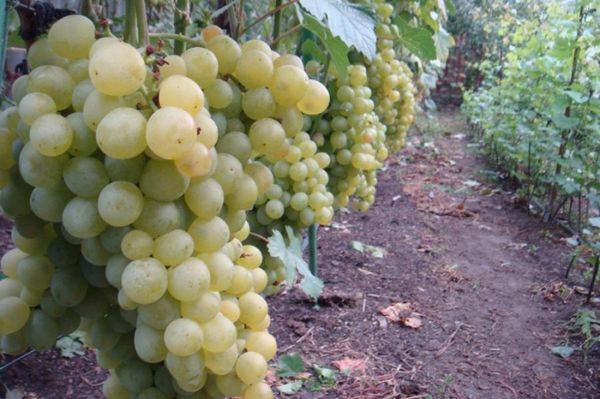For some, planting grapes is a business, and for some it is an opportunity to please your family and loved ones with tasty and fragrant berries, make preparations for the winter and in the cold evenings to remember the warm summer. But in any case, everyone tries to plant such a variety that would allow to realize all his desires. And Super Extra is not an exception.
It is unpretentious, resistant to frost, various diseases, and also has delicious fruits. That is why today we will tell you how to properly plant and care for Super Extra grapes to get a good harvest.
Table of contents
Description variety Super Extra
This grape variety can be grown in fairly cold regions. Super extra ripens very early. Literally in the second half of July, you can get the first fruits. If the summer is cool, then it is worth waiting until the beginning of August.
On average, a bunch of grapes weighs about 0.6-0.8 kg. Whereas when creating optimal conditions, it can reach mass in 1.5 kg.
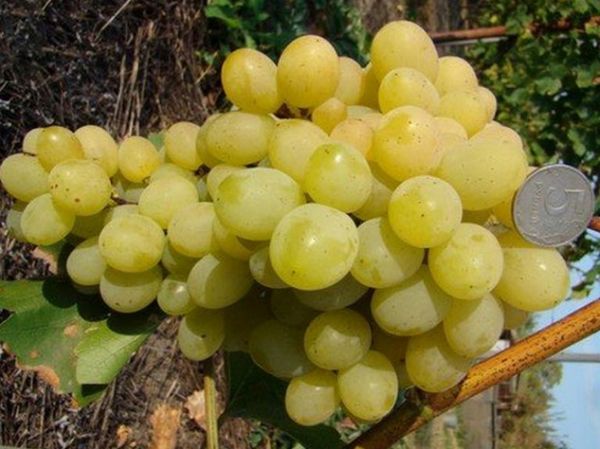
Characteristics of berries
Berries Super Extras are very combined with the variety known to us Arkadia. According to the description, they are very large, white in color, slightly pronounced egg-shaped. When fully matured, the clusters acquire a soft yellow tint. The weight of a berry is medium in size. 7-10 g.
Berry envelops quite dense, but edible peel. This allows the grapes to preserve their appearance during long-term transportation.
Pulp is different fleshy and juicy. When the grapes are fully ripe, it becomes so sweet and tasty that bite your fingers.
The taste for most people grapes is quite simple. But, as they say, all ingenious is simple.
The advantages and disadvantages of the variety
Like any grape variety, Super Extra has its positive and negative sides. We will talk more about them later.
The advantages include:
- extremely early ripening of fruits;
- high resistance to cold climate and frost resistance. The variety can withstand temperatures as low as 25 degrees Celsius below zero;
- high stability to various plant diseases and fungi;
- pleasant taste and attractive appearance;
- the ability to transport grapes over long distances with the preservation of the original appearance.
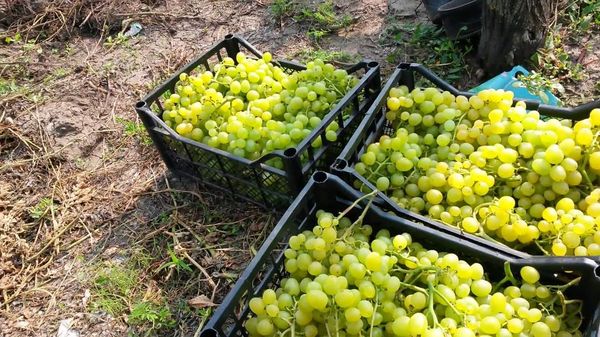
The disadvantages include:
- the cluster is full of berries of various sizes;
- some grape skin seems harsh;
- Phylloxera - a huge danger to the variety. It is difficult to fight with her.
Landing
For planting grapes of this variety is recommended to pick the sunniest place, not obscured by buildings, structures or other plants. Though in the shade the bushes will grow, but you should not expect a good harvest. The best option is south-west or south of your estate, protected from strong winds.
For the normal growth of bushes they need enough space. Therefore, the distance between individual seedlings should be not less than 1,5 - 2 m. If grapes grow near your home, it is recommended to retreat from construction. not less than a meter.
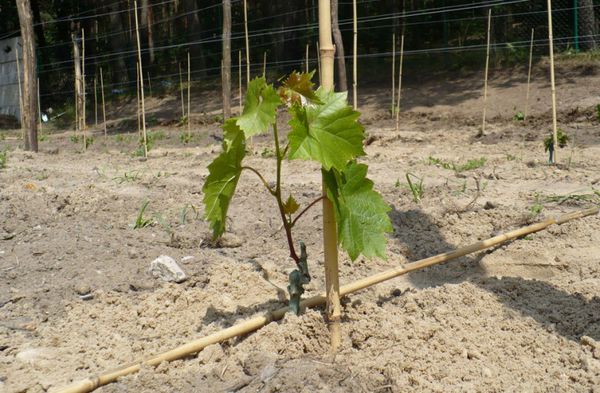
To grow a good harvest, it is important to choose the right place, including in the issue of soil. In this case, need fertile soilable to retain moisture. Sand - a bad option, because it does not give the right amount of micronutrients.
If the land is not as fertile as you would like, you need to fertilize it beforehand. Prepare in advance pit 60*60 and filled with humus diluted with water. One bucket should be enough. It is better to make a couple of weeks before the landing, so as not to get an oversupply of fertilizers. It only hurts.
Care for a young and mature vine
- regularity and quality of watering - a pledge of getting a good harvest, especially for the period of flowering Super Extras;
- to ensure the safety of moisture after watering, this place at the root should be covered with moss or sawdust;
- fertilizers of organic origin are well suited for top dressing;
- in autumn, it is important to shorten the shoots, cutting up to eight eyes;
- although the bushes are frost-resistant, they are worth the winter shelter;
- although the plant is resistant to various diseases and fungi, but spraying for preventive purposes has not been canceled.
Breeding methods
There are several options for breeding grapes:
- tapswhen breeding occurs as quickly and reliably as possible;
- cuttingswhen you have to work hard and wait. But this method is considered the most common;
- graftingwhen the harvest can be obtained as early as next year.That's just worth planting on the same bush, so as not to change the taste of the crop.
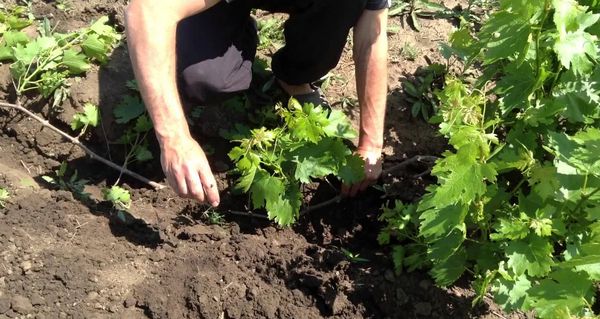
Diseases and pests
Shrubs of this grape variety are highly resistant to oidium and mildew. Various pests in the form of mites or aphids in this case are absolutely not terrible. And even if the growing conditions are unfavorable, the berries will crack, but they will not rot.
As preventive measures at the stage of the ovary, after a week at the end of flowering, it is worth treating the plants with Gibberellin and Vorchlorfenuron.
This hybrid is recommended to use for the cultivation of marketable berries. Since the term of its maturation will provide a high cost of goods sold. This variety is unpretentious and is highly resistant to weather changes and lower air temperatures. But it can be difficult to pollinate in adverse weather conditions. Although an experienced grower can also cope with this.
